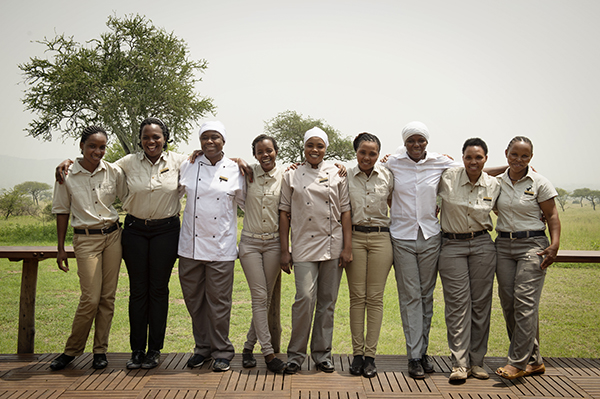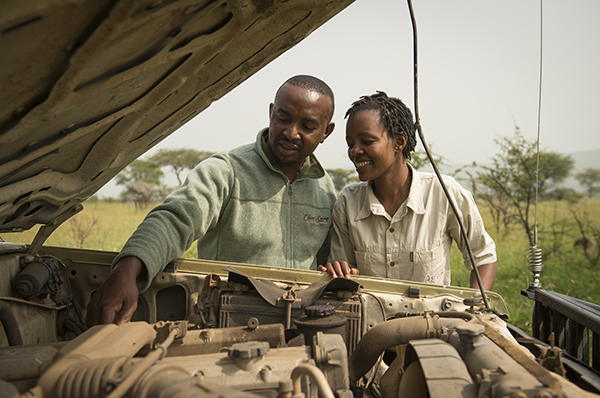Women in Tourism: Why the Inequality?
Initiatives to engage more women in the tourism sector are necessary and timely; far fewer women are employed in the industry than men; one female employee suggested to me that only 20% of lodge and camp staff in the Serengeti are female. There are many reasons for this: women are sometimes reluctant to put themselves forward for what is traditionally considered men’s roles and this in turn is the consequence of different factors: dislocated geography, perceived nature of the work, a family’s reluctance to allow their daughters/wives to work in a predominantly male environment far from home.
And added to all that, are the inherent limitations on account of being women in Tanzania – there is less societal belief in their capabilities, less support for them, and by extension, they have less belief in themselves, less confidence. These limitations are exacerbated further by practical restrictions – relatively few women in Tanzania drive, for example, many camps lack facilities to accommodate female staff.
Mary Kalikawe, owner of Kiroyera Tours and chair of the Association ofWomenin Tanzania, AWOTTA, says: “Women have been invisible and unheard for too long, yet they are the backbone, strength and wisdom of our country”. Mary confirmed that there is a very big gender imbalance in the sector, ‘especially in lucrative positions, say Taxi drivers – there are no women Taxi drivers in Tanzania whereas this is a facility used by all tourists, Tour guides too, a big skew towards men due to the nature of the job and on the boards for advising government, again very few women’, so there is very little heavyweight representation for them. Greater equality, according to the UN World Tourism Organisation (UNWTO), is an imperative part of sustainable tourism. Yet women are largely disregarded – especially in the developing world, an enduring characteristic of patriarchal attitudes where women are often at the mercy of men’s rules and decision making; they frequently don’t have a voice and yet by nature they present the potential to grow a whole new – and important – dynamic to the sector.
Equality in Tourism, a UK based consultancy working towards promoting women in tourism, says it’s a challenge getting more women involved, and more companies to recognise that and to promote their involvement. “Gender equality is the forgotten ingredient in sustainable tourism,” says director Tricia Barnett. ‘Whether it’s getting more women into boardrooms or improving lives for vendors, tour guides or chambermaids at the grassroots level, there’s much more to be done; our research into the gender makeup of boards highlights the fact that women make up less than 17% within tour operations, carriers, hotels and tourism associations.”
She believes mentoring is key – women who are mentored are supported in skill development and as a consequence are not just more able but their experience perpetuates a culture of mentorship thus, as Barnett observes, ‘building a stronger structure for opportunity and transformation.’ She reminds women how it important it is to understand their rights, thereby, for example, understanding that they may be able to access capital through microfinance; ‘Economically empowered women transform community culture as men learn to respect women.’
But on a very practical level, there is much that operators can do to be more inclusive of women. Barnett poses the question of accommodation; ‘A Kenyan manager-guide told me that when she arrives at a lodge with her group, the only accommodation available to her is in men’s shared dormitories. Until this changes, and there is equal opportunity and respect for both men and women, how can any organisation claim that it genuinely offers responsible and sustainable tourism?’
The post Women in Tourism: Why the Inequality? appeared first on Asilia Africa.
More Positive Impact Articles

Electric Vehicles: The Future Of East African Safari Travel?
12 January 2020October 2019 saw the arrival of our first electric, solar-powered safari vehi...

Its Our 15th Birthday: Celebrating 15 Years of Making a Genuine Difference
08 November 2019This year, we're celebrating our 15th birthday and commemorating 15 years of...

World Tourism Awards 2019: Asilia Recognised For Our Positive Impact
01 November 2019The World Tourism Awards acknowledge, reward, and celebrate excellence across...

Supersized Traditional Maasai Necklace
21 October 2019In 2009, we became a founding member of the Mara Naboisho Conservancy and sin...







